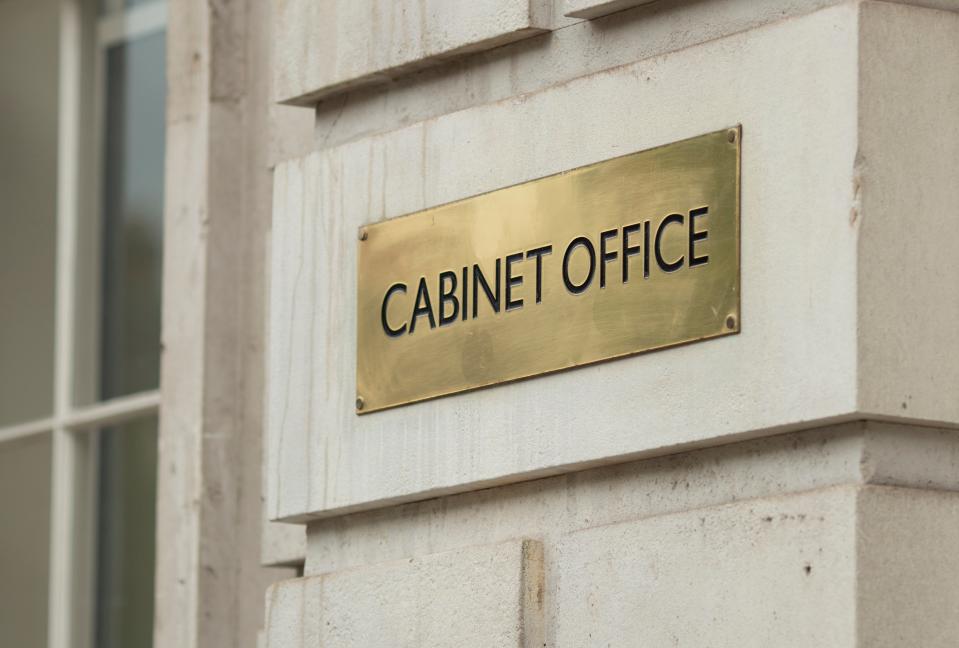The Top 10: Obsolete Ministries

Department of Office Furniture
(Getty Images)Thanks to Laocoon for suggesting this tribute to Shirley Williams, who died this month, and who was once secretary of state for prices. I restricted it to the names of actual government departments, rather than ministerial titles or responsibilities (Denis Howell, minister for drought, was a popular one); there was an actual Department of Prices and Consumer Protection, 1974-79. Roy Hattersley was the only other secretary of state.
1. War Office, 1694-1964. Headed by the Secretary at (not “for”) War, 1661-1794, then by the Secretary of State for War (and the Colonies, 1801-54). Renamed the Ministry of Defence in 1964 by Alec Douglas-Home during his brief premiership. Nominated by Ted Morris, Denis Keefe and Jatroa.
2. Northern Department and Southern Department. “In the 18th century a British cabinet consisted of two secretaries of state (compared to 15 today),” wrote William Hague in his biography of Pitt the Younger, whose father became Secretary of State for the Southern Department (responsible for domestic affairs, southern Europe and the colonies) in 1756. The Northern Department was responsible for northern Europe, including Russia. The two departments existed from 1660 until they were reorganised as the Foreign and Home offices in 1782. Thanks to Pat Roberts, Jack Tindale, Adrian McMenamin and Tim Durrant.
3. Ministry of Munitions, 1915-21. Created to deal with the shell shortage, with David Lloyd George as its minister, laying his claim to become prime minister in 1916. Thanks to Benjamin Dixon.
4. Ministry of Blockade, 1916-19. Responsible for preventing trade reaching Germany during the First World War. In 1939-45 there was a Ministry of Economic Warfare. Nominated by Mr Memory and Terry Stiastny.
5. Ministry of Information, 1918-46. Based in the Senate House during the Second World War, and the inspiration for the Ministry of Truth in George Orwell’s Nineteen Eighty-Four. Nominated by Graham Kirby, Arthur Spirling, Brian Cope and Terry Stiastny.
6. Burma Office, 1947-48. The India Office, 1858-1947, was nominated by Rob Jackson and Adam Behr. It included responsibility for Burma since 1937, and a rump of it briefly became the Burma Office, with a secretary of state (William Hare, fifth Earl of Listowel), for a few months until Burma’s independence in January 1948. Thanks to Mark Pack and Ryan Flack.
7. Ministry of Materials, 1951-54. Winston Churchill in 1952 responded to a question from an MP who asked what the ministry was for: “The duties of the Ministry of Materials continue to be those set out by the late government in command paper 8278. They are, in general, to ensure adequate supplies of the materials there specified.” Mr Memory again.
8. Department of Technical Cooperation, 1961-64. An early version of the department for international development. Another from Mr Memory.
9. Department for Children, Schools and Families. (Or for “curtains and soft furnishings”, as civil servants called it, to try to remember the initials.) Ed Balls the sole secretary of state, 2007-10. Thanks to John Hubbard.
10. Department for Exiting the European Union, 2016-20. The most recent of the oddly named ministries, which had only three secretaries of state: David Davis, Dominic Raab and Stephen Barclay. Nominated by Patrick Rock, Niall, John Oxley, Ian Moss and Right Sided.
Honourable mention for Theo Barclay, who lamented Jeremy Corbyn’s defeat in 2019, which deprived us of a Ministry for Peace (Fabian Hamilton is still shadow minister for peace and disarmament in Lisa Nandy’s shadow foreign office team). And for Ryan Flack, who nominated some of Michael Howard’s shadow cabinet posts: Theresa May as Shadow Secretary of State for the Family; John Redwood as Shadow Secretary of State for Deregulation; and Caroline Spelman as Shadow Secretary of State for Local and Devolved Government Affairs.
Nearly odd enough for inclusion were ministries or departments of or for: Aircraft Production, 1940-45; War Transport, 1941-46; Economic Affairs, 1964-69; National Heritage, 1992-97; Constitutional Affairs, 2003-07; Productivity, Energy, Industry and Science, 2005; and Energy and Climate Change, 2008-16.
There is always one: Vernon Barns pointed out that the Ministry of Sound never had a cabinet minister.
Next week: Joke candidates, so that you will know your Count Binface from your Landless Peasant on 6 May.
Coming soon: Ill-judged breakaways, to mark the sad passing of the European Super League.
Your suggestions please, and ideas for future Top 10s, to me on Twitter, or by email to top10@independent.co.uk
Read More
UK Covid-19 vaccinations: Latest figures
Not enough has changed since Stephen Lawrence’s murder– a reckoning is long overdue

 Yahoo Finance
Yahoo Finance 